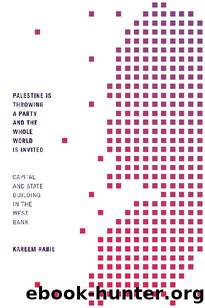Palestine Is Throwing a Party and the Whole World Is Invited by Kareem Rabie

Author:Kareem Rabie [Rabie, Kareem]
Language: eng
Format: epub
Publisher: Duke University Press
Published: 2021-03-29T00:00:00+00:00
Chapter Eight
Critique, Capital, and the Landscape
THE IDEOLOGICAL PRACTICES mobilized as part of the Oslo accordsâthe PA and the symbols of self-rule, the idea of an open market under occupation, the internalization and formalization of a land regimeâand the contemporary state-building project operate on the premise that the economy can be decoupled from politics and administration. Not unlike other representations that preceded it, Rawabi and its international backers have a vision of a Palestine that it is openâopen for business, open for building, and open for habitation. This is a âgreen,â âancientâ Palestine that, with some prodding and economic initiative, will be transformed along with those Palestinians who are stuck somewhere between modernity and poverty. This vision of progress through development, planning, and urbanization lies in direct contrast to both the lives of the rural laborers and the long history of Palestinian urbanism.
In chapter 4 I discussed some of the ways land in Palestine has been kept empty through Israeli control, planning, and practice. In this chapter I describe how the idea of the land, and the people and buildings on it, is tied to relations of production that have given nature an identity separate from politics and history, and beyond human relations (N. Smith 1984). Palestinians are well aware of how the political situation is inscribed in the landscape, yet by placing rural life outside of discussions of political economy, even critical discourse reshapes it in ways that may enable privatization and development.
As one architectural critic and planner told me, âPalestinian society is small-scale, family driven,â and Rawabi is an âexternal import of a global phenomenon.â This is one of the more salient critiques of Rawabi in Palestine, and it sits atop a framework in which present relations are understood through dead reckoning. Rather than a unidirectional import, I believe private development is emblematic of much wider processes of neoliberalization and simultaneous state building and state dissolutionâRawabi is a site where Palestinian politics and general forms of state-economy relations are visible. Moreover, it might also represent greater integration of Palestine into global markets by accommodating the current conditions of occupation with the imperatives of global capital. This is a Palestinian capitalist project that requires imagining, making, and growing a middle class of potential buyers, encouraging certain kinds of economic and political aspirations, and integrating them into an alternate political economic vision of Palestine. This project has the potential to create widespread and intertwined political, cultural, and economic shifts.
Anthropological approaches to international development (e.g., Ferguson 1994) describe how that endeavor imposes its own worldview on problems and solves those problems rather than the ones that may exist. The development situation in Palestine is related but further along: interventions, local governance, and state building are made in a dialectical relationship with changing ideological and political economic contexts. Interventions and their targets change together. Development and investment are not neoliberalizing Palestine in any single or straightforward way; they demonstrate the specific ties between Palestine and the rest of the world, even while circumscribed by and suspended within Israeli territorial, political, and economic imperatives.
Download
This site does not store any files on its server. We only index and link to content provided by other sites. Please contact the content providers to delete copyright contents if any and email us, we'll remove relevant links or contents immediately.
Cecilia; Or, Memoirs of an Heiress — Volume 1 by Fanny Burney(31443)
Cecilia; Or, Memoirs of an Heiress — Volume 3 by Fanny Burney(31035)
Cecilia; Or, Memoirs of an Heiress — Volume 2 by Fanny Burney(30982)
The Great Music City by Andrea Baker(22896)
We're Going to Need More Wine by Gabrielle Union(18123)
Bombshells: Glamour Girls of a Lifetime by Sullivan Steve(13157)
Pimp by Iceberg Slim(12999)
All the Missing Girls by Megan Miranda(12834)
Fifty Shades Freed by E L James(12491)
Talking to Strangers by Malcolm Gladwell(11983)
Norse Mythology by Gaiman Neil(11960)
Crazy Rich Asians by Kevin Kwan(8410)
Mindhunter: Inside the FBI's Elite Serial Crime Unit by John E. Douglas & Mark Olshaker(7897)
The Lost Art of Listening by Michael P. Nichols(6530)
Enlightenment Now: The Case for Reason, Science, Humanism, and Progress by Steven Pinker(6447)
Bad Blood by John Carreyrou(5816)
The Four Agreements by Don Miguel Ruiz(5577)
Weapons of Math Destruction by Cathy O'Neil(5094)
We Need to Talk by Celeste Headlee(4920)
